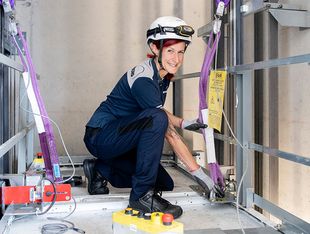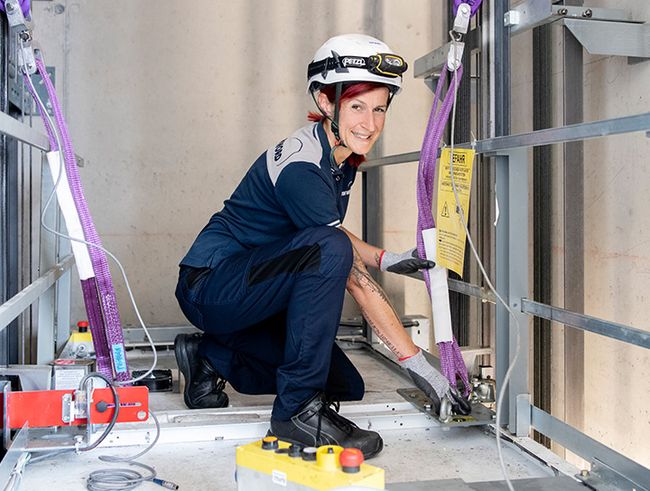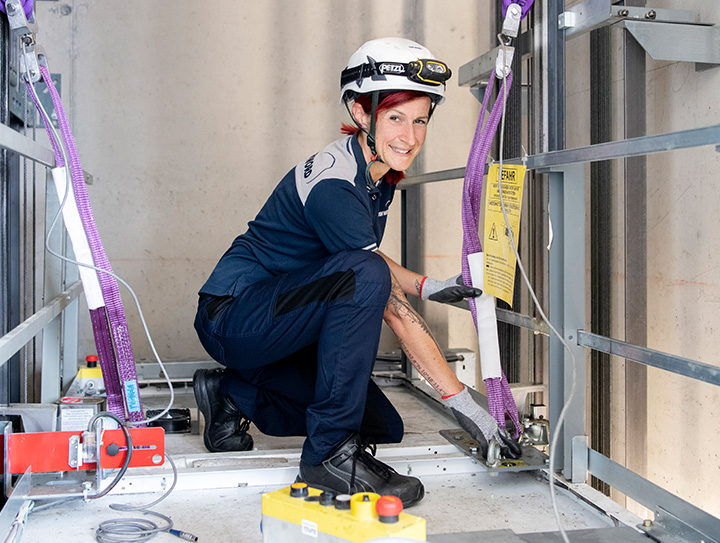Notified body and approved inspection body (ZÜS) for elevators




TÜV NORD supports you with many years of experience through tests, assessments and appraisals of your elevator systems and thus contributes to the safety of technical systems and equipment in buildings.
Our experts assess and test passenger and freight elevators, passenger circulating elevators (paternosters), facade elevators, construction elevators, elevators for the disabled and freight elevators in accordance with the Elevator Directive 2014/33/EU and the Ordinance on Industrial Safety and Health (BetrSichV).
We carry out all types of elevator inspections: when the elevator is placed on the market, before it is put into service for the first time, and recurrently, at different inspection intervals.
In the event of accidents and damage, we carry out the inspection.
An Overview of our Services for Elevator Tests
- Conformity assessment procedures according to the Elevator Directive
- Type examinations
- Certification of QA-systems
- Conformity statements
- Testing before initial commissioning in accordance with the Ordinance on Industrial Safety and Health
- Inspection before commissioning after modification / inspection before recommissioning after modification requiring inspection in accordance with the Ordinance on Industrial Health and Safety
- Periodic inspections according to the Ordinance on Industrial Safety and Health (main inspection)
- Intermediate inspection in accordance with the Ordinance on Industrial Safety and Health
- Testing after accident and damage analyses / safety assessment
- Testing of firefighting elevators
- Electronic inspection certificate on site by scanning a system-specific QR code
- Assessment of individual components, e.g. remote emergency call systems
- Statements and expert opinions
- Statements of conformity
ZÜS inspection for elevators
Operators of elevators, which are systems requiring monitoring, are responsible for the safe operation of their systems at all times. In Germany, the Product Safety Act (ProdSG) and the Ordinance on Industrial Safety and Health (BetrSichV) regulate the points that must be observed. This applies to all elevator systems. Insofar as these systems are classified as requiring inspection, they may only be inspected by notified bodies and approved inspection bodies (ZÜS).
To ensure that the legal requirements are reliably fulfilled, TÜV NORD, as a ZÜS, carries out the periodic inspections and intermediate inspections that are required during the entire service life of the system. Our ASIS II elevator testing system is a convenient substitute for test weights.
The tests are performed by independent and competent experts.
-
Inspections before initial commissioning (§15 Betriebssicherheitsverordnung - BetrSichV)
-
Inspection before recommissioning after a change requiring inspection (§15 BetrSichV)
-
Periodic inspection (§16 BetrSichV)
-
ASIS II test as a substitute for test weights
-
Intermediate inspection (§16 BetrSichV)
-
Safety assessment after accident and damage report (§19 BetrSichV)
-
Testing of fire department elevators
Inspection before commissioning of elevators (according to Lift Directive 2014/33/EU)
Before a new elevator may be put into operation, it must be proven that it complies with all valid specifications, in accordance with the state of the art and that it fulfils the basic safety and health protection requirements of the EC- Elevator Directive.
TÜV NORD supports the manufacturer in this process so that the elevator can be put into operation economically and safely. If all test steps, such as the preliminary inspection of the design documents and the inspection at the operating site upon completion, are successfully completed, a certificate is issued.
The manufacturer can then issue the declaration of conformity and affix the CE-Mark to the elevator.
If a certain type of elevator is to be built in larger numbers, it is advisable to subject the system to an EC type examination; essential parts of the conformity assessment then only have to be carried out once. TÜV NORD is also a competent partner for elevator manufacturers in this regard.
In addition, proof of one's own elevator competence through a quality safety system in accordance with the Elevator Directive can make it easier for the manufacturer to place elevators on the market. TÜV NORD certifies such systems - advantage for the manufacturer: he can carry out essential parts of the conformity assessment on his own responsibility.
-
Individual inspections of elevator systems according to RL 2014/33/EU Annex VIII
-
Final inspections of elevators according to RL 2014/33/EU Annex V
-
EC type examinations of elevator systems according to RL 2014/33/EU Annex IV B
-
Certification of quality assurance systems according to RL 2014/33/EU Annexes X, XI, XII
-
Statements of conformity on technical aspects of elevators
ASIS II System - Innovative Technology for Recurring Inspections on Elevator Systems
In order to be able to perform recurring elevator inspections quickly, gently and cost-effectively for the system, TÜV NORD engineers use ASIS II. The innovative electronic testing system is based on the company's own patents and determines the safety indicators for the condition and development of the system without load weights.
The ASIS II testing system is a convenient replacement for test weights in the recurring testing of elevator systems. It replaces all legally required tests on an elevator system that would be necessary with weights. The patented measuring procedures of the ASIS II test system were developed by TÜV NORD and reflect the many years of experience of an independent testing organization.
The test system has proven itself in daily use for many years and is not only used for recurring tests, but also for the preparation of expert opinions and statements.
- Traction measurement on traction elevators
- Testing of descent prevention on hydraulic elevators
- Testing of the effectiveness of fall protection systems
- Assessment of the travel behavior of the elevator system, such as speed and braking distance
- Scales for determining the mass of system components such as the car or counterweight
- Verification of counterweight balancing
- Pressure resistance of hydraulic systems
Additions to elevator tests
In addition to the one-time and recurring elevator inspections, TÜV NORD offers you further services and support for the safe operation of elevator systems.
Dealing with cyber threats on elevators
On your audit report, you may have found this note: "Documentation to address cyber threats was not provided."
We have compiled information on this for you here:
Prüfung der Maßnahmen des Betreibers gegen Cyberbedrohungen von überwachungsbedürftigen Anlagen
Amended Ordinance on Industrial Safety and Health
The amended Ordinance on Industrial Safety and Health (Betriebssicherheitsverordnung) came into force in June 2015 and is aimed at employers who provide work equipment and their equivalent operators of systems requiring monitoring. The following new regulations apply to elevators:
• The elevator must be marked, e.g. in the form of an inspection sticker, with information about the month and year of the next inspection.
• By the end of 2020 at the latest, all elevators for passenger transportation must be equipped with a two-way communication (Zweiwege-Kommunikationssystem) system.
• Exceptions exist for elevator systems in accordance with the Machinery Directive (Maschinenrichtlinie): the trapped person must only be able to call for help.
• An emergency plan must be prepared for each elevator installation, as well as an up-to-date emergency rescue manual.
• The inspection prior to commissioning now applies to all elevator systems with passenger transport.
• The maximum inspection period for elevator systems according to the Machinery Directive is 2 years. (Exception: Inspection periods documented up to 31.05.2015 continue to apply).
• The inspection period for recurring inspections (main inspection, intermediate inspection) can be shortened depending on the condition or operation of the system.
• Elevator-external safety devices such as fire and evacuation controls must be assessed as part of the main inspection.
• Test certificates can also be kept in electronic form.
Paperless documentation of the inspection certificate directly at the elevator
The QR code is attached to the tested system by the TÜV NORD expert in the form of a sticker. Plant operators or authorized users then have the option of reading the QR code conveniently and paperlessly at any time using a suitable device (e.g. smartphone). Decoding takes place automatically using the appropriate app (QR code reader), and the user is taken directly to the corresponding TÜV NORD website to view the inspection certificate and other plant data.
Electronic inspection certificate on site by scanning a system-specific QR code to document the inspection activities (ZÜS):
- Testing prior to commissioning of the elevator
- Inspection before commissioning after modification of the elevator
- Recurring elevator inspection
-
Intermediate inspection of the elevator
-
Inspection after accident and damage report of the elevator
-
Safety evaluation of the elevator
- Fulfillment of legal obligations
- Qualified statement about the technical condition of your elevator system
- Identify potential hazards in good time
- Informative electronic inspection certificate
- Immediate availability of the inspection certificate via QR code
- No time-consuming search for the last inspection certificate
Emergency plan for elevators
We have prepared a sample emergency plan for you, which you are welcome to download and use. The emergency plans must be handed over to the responsible emergency service before commissioning or placed near the plant in case no emergency service is provided.
Checklist for the authorized person according to TRBS 3121
Our checklist for commissioned persons (formerly elevator attendants) according to TRBS 3121 issue 10/2018 enables a structured procedure of the tasks to be performed.